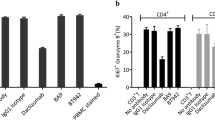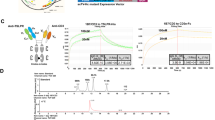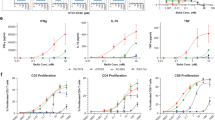Abstract
Antibody-drug conjugates (ADCs) are potent cytotoxic drugs linked to antibodies through chemical linkers, and allow specific targeting of drugs to neoplastic cells. The expression of CD22 is limited to B-cells, and we show that CD22 is expressed on the vast majority of non-Hodgkin's lymphomas (NHLs). An ideal target for an ADC for the treatment of NHL would have limited expression outside the B-cell compartment and be highly effective against NHL. We generated an ADC consisting of a humanized anti-CD22 antibody conjugated to the anti-mitotic agent maytansine with a stable linker (anti-CD22-MCC-DM1). Anti-CD22-MCC-DM1 was broadly effective in in vitro killing assays on NHL B-cell lines. We did not find a strong correlation between in vitro potency and CD22 surface expression, internalization of ADC or sensitivity to free drug. We show that anti-CD22-MCC-DM1 was capable of inducing complete tumor regression in NHL xenograft mouse models. Further, anti-CD22-MCC-DM1 was well tolerated in cynomolgus monkeys and substantially decreased circulating B-cells as well as follicle size and germinal center formation in lymphoid organs. These results suggest that anti-CD22-MCC-DM1 has an efficacy, safety and pharmacodynamic profile that support its use as a treatment for NHL.
This is a preview of subscription content, access via your institution
Access options
Subscribe to this journal
Receive 12 print issues and online access
$259.00 per year
only $21.58 per issue
Buy this article
- Purchase on Springer Link
- Instant access to full article PDF
Prices may be subject to local taxes which are calculated during checkout





Similar content being viewed by others
References
Hennessy BT, Hanrahan EO, Daly PA . Non-Hodgkin lymphoma: an update. Lancet Oncol 2004; 5: 341–353.
Ries LAG, Krapcho M, Stinchcomb DG, Howlader N, Horner MJ, Mariotto A et al. EER Cancer Statistics Review. 1975–2005, National Cancer Institute. Bethesda, MD. http://www.seer.cancer.gov/csr/1975_2007/index.html.
Carter PJ, Senter PD . Antibody-drug conjugates for cancer therapy. Cancer Journal (Sudbury, Mass.) 2008; 14: 154–169.
Polakis P . Arming antibodies for cancer therapy. Curr Opin Pharmacol 2005; 5: 382–387.
Hamann PR, Hinman LM, Beyer CF, Lindh D, Upeslacis J, Flowers DA . et al. An anti-CD33 antibody-calicheamicin conjugate for treatment of acute myeloid leukemia. Choice of linker. Bioconjugate Chem 2002; 13: 40–46.
Kovtun YV, Audette CA, Ye Y, Xie H, Ruberti MF, Phinney SJ et al. Antibody-drug conjugates designed to eradicate tumors with homogeneous and heterogeneous expression of the target antigen. Cancer Res 2006; 66: 3214–3221.
Sanderson RJ, Hering MA, James SF, Sun MM, Doronina SO, Siadak AW et al. In vivo drug-linker stability of an anti-CD30 dipeptide-linked auristatin immunoconjugate. Clin Cancer Res 2005; 11 (2 Part 1): 843–852.
Doronina SO, Mendelsohn BA, Bovee TD, Cerveny CG, Alley SC, Meyer DL et al. Enhanced activity of monomethylauristatin F through monoclonal antibody delivery: effects of linker technology on efficacy and toxicity. Bioconjugate Chem 2006; 17: 114–124.
Erickson HK, Park PU, Widdison WC, Kovtun YV, Garrett LM, Hoffman K et al. Antibody-maytansinoid conjugates are activated in targeted cancer cells by lysosomal degradation and linker-dependent intracellular processing. Cancer Res 2006; 66: 4426–4433.
Polson AG, Calemine-Fenaux J, Chan P, Chang W, Christensen E, Clark S et al. Antibody-drug conjugates for the treatment of non-Hodgkin's lymphoma: target and linker-drug selection. Cancer Res 2009; 69: 2358–2364.
Holden SN, Beeram III M, Krop IE, Burris HAI, Birkner M, Girish S et al. A phase I study of weekly dosing of trastuzumab-DM1 (T-DM1) in patients (pts) with advanced HER2+ breast cancer. J Clin Oncology 2008; 26 (May 20 suppl). 48s (Abstract 1029).
Lewis Phillips GD, Li G, Dugger DL, Crocker LM, Parsons KL, Mai E et al. Targeting HER2-positive breast cancer with trastuzumab-DM1, an antibody-cytotoxic drug conjugate. Cancer Res 2008; 68: 9280–9290.
Polson AG, Zheng B, Elkins K, Chang W, Du C, Dowd P et al. Expression pattern of the human FcRH/IRTA receptors in normal tissue and in B-chronic lymphocytic leukemia. Int Immunol 2006; 18: 1363–1373.
Carter P, Presta L, Gorman CM, Ridgway JB, Henner D, Wong WL et al. Humanization of an anti-p185HER2 antibody for human cancer therapy. Proc Natl Acad Sci USA 1992; 89: 4285–4289.
Polson AG, Yu SF, Elkins K, Zheng B, Clark S, Ingle GS et al. Antibody-drug conjugates targeted to CD79 for the treatment of non-Hodgkin's lymphoma. Blood 2007; 110: 616–623.
Stephan JP, Chan P, Lee C, Nelson C, Elliott JM, Bechtel C et al. Anti-CD22-MCC-DM1 and MC-MMAF conjugates: impact of assay format on pharmacokinetic parameters determination. Bioconjugate Chem 2008; 19: 1673–1683.
Zheng B, Fuji RN, Elkins K, Yu SF, Fuh FK, Chuh J et al. In vivo effects of targeting CD79b with antibodies and antibody-drug conjugates. Mol Cancer Ther 2009; 8: 2937–2946.
Steinfeld SD, Tant L, Burmester GR, Teoh NK, Wegener WA, Goldenberg DM et al. Epratuzumab (humanised anti-CD22 antibody) in primary Sjogren's syndrome: an open-label phase I/II study. Arthritis Res Ther 2006; 8: R129.
DiJoseph JF, Dougher MM, Kalyandrug LB, Armellino DC, Boghaert ER, Hamann PR et al. Antitumor efficacy of a combination of CMC-544 (inotuzumab ozogamicin), a CD22-targeted cytotoxic immunoconjugate of calicheamicin, and rituximab against non-Hodgkin's B-cell lymphoma. Clin Cancer Res 2006; 12: 242–249.
DiJoseph JF, Goad ME, Dougher MM, Boghaert ER, Kunz A, Hamann PR et al. Potent and specific antitumor efficacy of CMC-544, a CD22-targeted immunoconjugate of calicheamicin, against systemically disseminated B-cell lymphoma. Clin Cancer Res 2004; 10: 8620–8629.
DiJoseph JF, Popplewell A, Tickle S, Ladyman H, Lawson A, Kunz A et al. Antibody-targeted chemotherapy of B-cell lymphoma using calicheamicin conjugated to murine or humanized antibody against CD22. Cancer Immunol Immunother 2005; 54: 11–24.
Dang N, Smith M, Offner F, Verhoef G, Johnson P, Rohatiner A et al. Anti-CD22 Immunoconjugate inotuzumab ozogamicin (CMC-544)+rituximab: clinical activity including survival in patients with recurrent/refractory follicular or ‘Aggressive’ lymphoma. Blood (ASH Annual Meeting Abstracts) 2009; 114: 242–243 (Abstract 584).
Younes A, Gordon L, Kim S, Romaguera J, Copeland A, de Castro Farial S et al. Phase I Multi-Dose Escalation Study of the Anti-CD19 Maytansinoid Immunoconjugate SAR3419 Administered by Intravenous (IV) Infusion Every 3 Weeks to Patients with Relapsed/ Refractory B-Cell Non-Hodgkin's Lymphoma (NHL). Blood (ASH Annual Meeting Abstracts) 2009; 112: 243 (Abstract 585).
Dornan D, Bennett F, Chen Y, Dennis M, Eaton D, Elkins K et al. Therapeutic potential of an anti-CD79b antibody-drug conjugate, anti-CD79b-vc-MMAE, for the treatment of non-Hodgkin lymphoma. Blood 2009; 114: 2721–2729.
Acknowledgements
We thank, Katharine C Lai and Erin K Maloney (Immunogen) for conjugation support, Klara Totpal for cell line production, David Xie for PK support, Kathy Howell and the PDB FACS facility for assistance in characterization of the B-cell subset assay in cynomolgus monkeys, Kathleen McKeever for oversight of the cynomolgus monkey safety study, Vanitha Ramakrishnan for critical reading and comments on the paper, Caroline Looney for assistance with the paper, Imola Fodor for statistical support, Fiona Zhong, Bing Zheng and Kristi Elkins for technical support, Darshana Patel and Susan Spencer for project management support and Sheila Bheddah, Linda Hall and Shari Lau for IHC support.
Author information
Authors and Affiliations
Corresponding author
Ethics declarations
Competing interests
AG Polson, M Williams, AM Gray, RN Fuji, KA Poon, J McBride, H Raab, T Januario, M Go, J Lau, S-F Yu, C Du, F Fuh, C Tan, Y Wu, W-C Liang, S Prabhu, J-P Stephan, J-A Hongo, RC Dere, R Deng and A Ebens are employees of Genentech, a subsidiary of Hoffman-LaRoche. M Cullen, R de Tute, F Bennett and A Rawstron and Andrew Jack receive funding from Genentech, a subsidiary of Hoffman-LaRoche.
Additional information
Supplementary Information accompanies the paper on the Leukemia website
Rights and permissions
About this article
Cite this article
Polson, A., Williams, M., Gray, A. et al. Anti-CD22-MCC-DM1: an antibody-drug conjugate with a stable linker for the treatment of non-Hodgkin's lymphoma. Leukemia 24, 1566–1573 (2010). https://doi.org/10.1038/leu.2010.141
Received:
Revised:
Accepted:
Published:
Issue Date:
DOI: https://doi.org/10.1038/leu.2010.141
Keywords
This article is cited by
-
Emerging phagocytosis checkpoints in cancer immunotherapy
Signal Transduction and Targeted Therapy (2023)
-
CSPG4 as a target for the specific killing of triple-negative breast cancer cells by a recombinant SNAP-tag-based antibody-auristatin F drug conjugate
Journal of Cancer Research and Clinical Oncology (2023)
-
Antibody-drug conjugates for the treatment of lymphoma: clinical advances and latest progress
Journal of Hematology & Oncology (2021)
-
T cells redirected against Igβ for the immunotherapy of B cell lymphoma
Leukemia (2020)
-
Combining Biology and Chemistry for a New Take on Chemotherapy: Antibody-Drug Conjugates in Hematologic Malignancies
Current Hematologic Malignancy Reports (2018)



